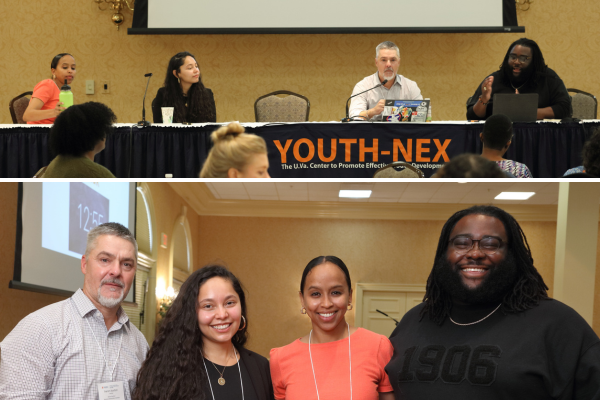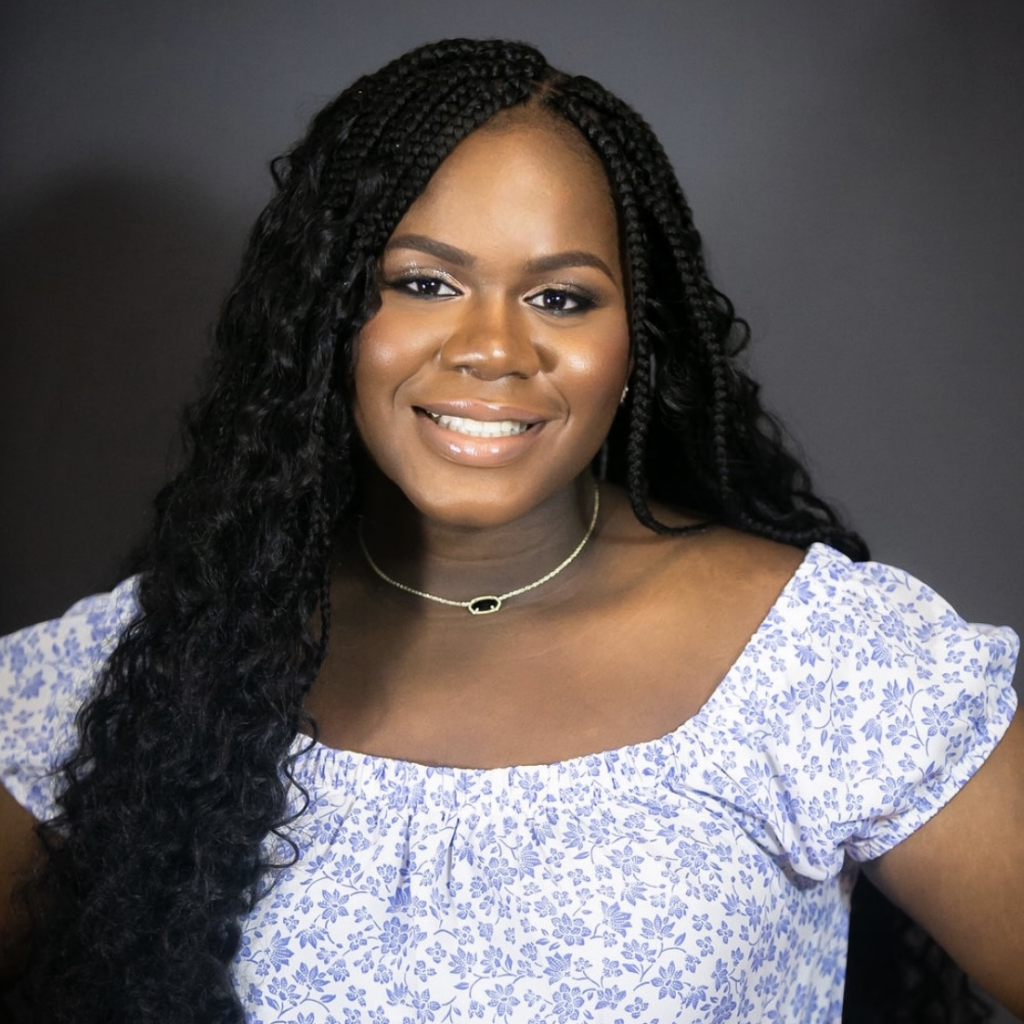By: Isabel, a first year at UVA
Highlights:
- Youth-Nex recently hosted their 8th conference entitled Pass the Mic: Amplifying Youth Voice & Agency, co-chaired by Drs. Wintre Foxworth Johnson and Nancy Deutsch.
- In this Pass the Mic blog series, we are highlighting each of the sessions from the conference, sharing videos, and uplifting youth voices to summarize and reflect on what was discussed.
- Isabel, a first year at UVA, summarizes the 5th session about “Politics, Organizing, & Civic Engagement,” highlighting important take-home points about empowering youth voices, engagement, activism and education.
Joined by experts and professionals including, Dr. Edward Scott, Dr. Josefina Bañales, Aaron Azelton, and Dr. Johari Harris, this panel focused on the importance of young voices in political engagement. Public policy and politics are often fields where youth voices can be overlooked for a plethora of reasons, however the leaders on this panel address this issue while simultaneously advocating for the increased involvement of young people, especially those who belong to marginalized groups, within the political atmosphere.
Youth Voices & Civic Engagement
Right off the bat, moderator, Dr. Scott, sets up the discussion by asking a question that focuses on the importance of youth voices when it comes to political and civic engagement. Dr. Bañales jumps in by highlighting the framework that women of color have built to support “youth using their voice[s] to challenge oppression and whiteness” within society. For Black and Brown youth, civic engagement has always been a major aspect of their lives due to the intertwined relationship between politics and racial justice. Coincidentally, young people who are part of minority groups are often hurt most by oppression but are on the front lines of fighting oppression as well. To create more individuals who will fight for democracy and equity, it is important to support young people, especially those who belong to marginalized groups, who are interested in politics, and also encourage more youth to engage with policy-making and government, both locally and nationally.
Diverting the conversation, Dr. Scott asks the panelists to speak on the level of engagement that young people have in different scopes of government, whether that be internationally, nationally, or locally. Aaron Azelton starts off this discussion with a strong statement: “young people are inherently political.” Regardless of their future career plans or goals, youth are very politically aware and oftentimes are extremely involved with local politics that address issues affecting them in their communities. Additionally, it is very important to understand that young people’s political awareness and engagement show up in various ways that may not be as visible or as public as a protest or social media campaign. Many times political engagement for young people is happening in their day-to-day lives through conversations they have with one another, or even adults as well. Also, especially for youth who are first-generation Americans, their form of political engagement may look like translating legal documents and navigating the political landscape of this nation to help their immigrant parents. Supporting adolescents’ involvement in civic engagement means understanding the different ways that each young person displays activism and political organization, depending on their strengths and individual backgrounds.
Youth Activism & Education
The panelists also focused on where and how young people can build crucial activism skills that they need in civic engagement. Schools become a major aspect of this conversation with two panelists (Dr. Bañales and Dr. Harris). They had different opinions on the ways schools can be used as a place to create more activists:
- Dr. Bañales highlights that, historically, we would focus on building activists in schools because young people spent most of their time there. However, we are moving away from schools due to the sensitivity around conversations that focus on race and oppression; additionally, many teachers don’t have the capacity to educate students on these matters in addition to completing their workload. Due to this, most opportunities for advocacy are moving out of schools and utilizing media to encourage more youth political engagement.
- Dr. Harris acknowledges the issues highlighted by Dr. Bañales, however she explains that schools can be the perfect place to encourage activism, especially in public schools where there are typically diverse students with different backgrounds. Schools can resemble micro democracies where students can negotiate and learn how to navigate simple issues like sharing pencils or combat larger problems like changing unjust and oppressive structures.
Despite the two contradicting opinions, both panelists agreed that it is important to move away from traditional and historical ways of encouraging civic engagement.
Moderator, Dr. Scott, continues the panel by asking a highly anticipated question about the impact of CRT (critical race theory) bans on youth political awareness and education. Panelist, Dr. Harris, begins that conversation by stating that laws like the CRT bans are not new. All throughout American history, there has always been pushback against progress; educators who have always been teaching content that is similar to CRT will continue to do so, while educators who have not been teaching CRT content will continue avoiding the topic regardless of the CRT ban being passed or not. Therefore, attempts to overanalyze and break down this ban may not be as impactful as people imagine. Dr. Bañales emphasizes that “the work will continue”; conversations about race will still occur outside of school, in homes, amongst friends, and via social media. Although school is a very important place to have these conversations, we can still continue to educate youth outside of school and ensure that they continue to be politically aware.
How To Support Youth Civic Engagement
The panelists divert towards another discussion about the support that youth need from adults to be more politically engaged. The intergeneration approach is the best way to really encourage youth advocacy; collaborating with adults and learning from them can greatly contribute to the growing political voice of a young person. Dr. Harris brings up a great example of the civil rights movement and how the partnership between adults and young people led to an immense amount of success. Additionally, adults, especially adults who mentor young people of color, need to recognize that oftentimes youth advocacy has many Eurocentric features. However, a young Black person cannot speak up in the same ways that a young White person can speak up, so it is important to teach Black and Brown youth to be an advocate in their own way and not force them to emulate the actions of young White activists.
As the panel comes to an end, panelists are asked about the resources to promote youth well-being as they navigate their political voice and civic engagement. They highlight some resources that adults working with youth activist should take into consideration:
- Money is the first resource identified by panelists that youth need in order to continue leading and speaking up. Coincidentally, this is not the first time that the subject of money has come up during this conference, and the panelists in this discussion emphasize the impact money has on youth engagement. Money can be used as an incentive to engage more youth and persuade more adults to listen to youth; additionally, youth need to be adequately compensated for their time and efforts, and money is one of the many ways to show appreciation.
- Community and compassion are other ways to support youth in civic engagements. Activism can be very heavy because oftentimes youth are dealing with various forms of oppressive systems. It is important to encourage youth to take time in order to heal and do things that bring joy. Essentially, even though young people may be activists, they are still young and they deserve to be able to participate in hobbies and activities that have absolutely nothing to do with activism.
- Lastly, understanding that young people play different roles in activism. Oftentimes, adults create rigid definitions of political engagement and expect all youth to fit into these stiff roles. However, it is important that youth have various opportunities that appeal to their different personalities. Not every single youth has to be on the front lines or at every single rally/protest, so it is crucial to find roles where youth with different interests can thrive.

Did you miss one of our six sessions from the Pass the Mic: Amplifying Youth Voice & Agency conference? Go back and watch these panels with youth voices, and read the summaries, primarily written by the youth participants, on the following topics:
- A Dialogue Among Young People on Youth Voice & Agency in the 21st Century
- Social & Justice Systems
- Youth Voice & Agency in Schools
- Health & Well-Being
- Politics, Organizing & Civic Engagement
- Programs that Elevate Youth Voice & Agency
If you have any comments or questions about this post, please email Youth-Nex@virginia.edu. Please visit the Youth-Nex Homepage for up to date information about the work happening at the center.

Author Bio: Originally from Nigeria, Isabel Ohakamma was raised in Houston, Texas. She currently attends the University of Virginia as one of a handful of Posse Scholars selected from Texas and given a full tuition scholarship to UVA. She is currently a first-year student and plans to double major in Psychology and Youth & Social Innovation. Isabel is passionate about amplifying the voices of youth. In high school, she led conferences where she facilitated discussions with leaders of school districts about the importance of diversifying curriculums in K-12 public schools in Texas. In 2021, her advocacy and dedication to highlighting the voices of young people in her community led her to be recognized as one of twelve Bezos Scholars in the nation. Isabel is also a member of UCLA’s Youth National Scientific Council on Adolescence where she is able to actively represent adolescents and their views. On UVA Grounds, she is a member of the Student Council Legislative Committee and is a proud Echols Scholar. In the future, Isabel plans to complete a Ph.D. program and continue advocating for youth in her career!
